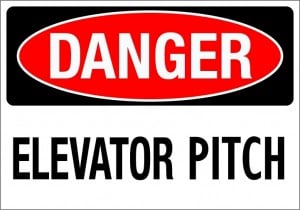In the November 27, 2012 Ask The Headhunter Newsletter, a writer asks for a job at Ask The Headhunter:
Hi Nick,
[1] I’m going to cut to the chase: I want to write for “Ask The Headhunter”! [2] My name is Melanie and I’m a former educator turned researcher/blogger. [3] I stumbled upon your blog researching for another article weeks ago. [4] My expertise/niche is education so most of my articles deal with learning — whether they’re directed at instructors, students, parents, or business leaders. [5] But of course my edu-centric pieces are always tailored to each blog’s audience. Check out some of my clips to see more of what I mean:
[6] [six URLs to her articles]
[7] Hope to discuss ideas soon,
Melanie
My Rant
Resumes make me cringe. Elevator pitches make me cringe more. Elevator pitches delivered in e-mail make me wanna barf. Nothing is more banal, misdirected, or useless to someone that doesn’t know you.
 Consider how often an elevator pitch, or a cover letter, or a job inquiry reads like the note above. Maybe you’ve written one yourself.
Consider how often an elevator pitch, or a cover letter, or a job inquiry reads like the note above. Maybe you’ve written one yourself.
I want to tell you what’s wrong with these pitches. Then I want to know what you think — because most people seem to believe they must “craft” a chunk of b.s. like this to get an employer’s attention.
I’ve tagged each part of the pitch I received with a number. This is gonna get ugly, but let’s tear it apart. (I offer no apologies to Melanie. She offered none to me. But I thank her for helping me write this edition of the newsletter.)
[1] Melanie isn’t cutting to the chase.
The chase is my need to produce profit for my business. What Melanie wants to do (“to write for Ask The Headhunter”) is relevant only if it fits in with my business objectives. What does she know about them?
Oops. If Melanie had spent five minutes on the ATH website, she’d know that — except for one small section, which she never mentions — all the articles are written by me.
And that’s the first problem with elevator pitches: They are by design generic and thus presumptuous. You can’t create an elevator pitch for someone you don’t know and haven’t met yet. If you think I’m full of baloney, try this elevator pitch on the next person you meet that you’re attracted to:
“My ability to make [men, women] happy by exciting them results in fun relationships and could lead to marriage.”
Trust me. When you’re on the receiving end, that’s what an elevator pitch — about anything — sounds like.
[2] I don’t care what Melanie’s former career was.
When you have just a moment or two to engage someone in a business discussion, why would your speech be “crafted” about yourself? The answer is easy: You don’t know anything about the business of the person you’re talking to — the pitch is designed to be memorized and regurgitated in elevators to any captive.
Want my attention? Tell me you know what my business is about and how you can make it better. Tell me about yourself later, after I behave as if I want to know.
[3] Melanie “stumbled” upon my blog.
The analog in our social lives is this phone call:
“Hi. I had nothing to do tonight so I thought I’d call you.”
Gimme a break.
[4] Four sentences into it, Melanie is still talking about herself.
It’s pretty clear she has no idea what Ask The Headhunter is about. She worked in education, so she will write educational articles. About whatever.
Elevator pitches are painful to create because they must account for the orator’s ignorance yet pretend to be insightful. Save yourself the trouble. If you need to break the ice with someone you don’t know, don’t talk about yourself or express what you think. Instead, ask them a question. People love it when we express interest in them. They are turned off when we recite stuff about ourselves.
[5] Melanie suggests she’s qualified.
What is Melanie qualified to do for me? She hasn’t indicated she has any idea what I need. She’ll write anything for any audience, never mind who the audience is. And that’s the fatal flaw with any elevator pitch. By design it demonstrates one thing above all else: The speaker knows so little about the listener that she promises anything and everything.
Here’s the insult: After the recitation, an elevator pitcher wants me to go figure out what to do with her and her ideas. No thanks. I’d rather she do that work.
[6 & 7] This part of the pitch is the punch line.
Usually, an elevator pitch ends with the orator handing over a resume or suggesting the listener invest a couple of hours in breakfast or lunch to listen to more. After delivering this elevator pitch about herself, Melanie wants me to spend the next hour reading six of her articles.
 She’s showing me examples of her work — and she’s telling me to go figure out whether her work is relevant to my business. I didn’t approach her — she approached me. So the burden is on the elevator pitcher to make her case. Suggesting I go figure it out is not making a case.
She’s showing me examples of her work — and she’s telling me to go figure out whether her work is relevant to my business. I didn’t approach her — she approached me. So the burden is on the elevator pitcher to make her case. Suggesting I go figure it out is not making a case.
Consider what an elevator pitch is really about: You and your assumptions.
If you want to do business with someone, why would you open the conversation by talking about yourself and about what’s important to you? If you want to do business with me, spend the precious minute you have with me proving you know about my business and what I need. Prove you thought enough about my business in advance to offer something useful to me.
Ouch — you’d have to invest an awful lot of time and effort in me first, eh? Why would you? Why, indeed? And why should I devote two seconds to listening to you recite?
Do you have an elevator pitch? What is it? What reactions do you get when you recite it? What’s your reaction to elevator pitches? Am I just a rude S.O.B. who needs to be more tolerant and pretend to listen to anyone who wants my time? I want to know what you think.
: :
 The answer goes back to the employer. If an employer wants to do a sound, thorough search for the best candidates to fill a job, the employer will not post the job. (Do you really want 10,000 applicants? If yes, why? Back to Personnel Hell with you.) The employer will conduct its own quiet search, or use a headhunter to conduct it.
The answer goes back to the employer. If an employer wants to do a sound, thorough search for the best candidates to fill a job, the employer will not post the job. (Do you really want 10,000 applicants? If yes, why? Back to Personnel Hell with you.) The employer will conduct its own quiet search, or use a headhunter to conduct it.





 Those recruiters obtain lists of “candidate criteria” from their clients, and they pattern-match those criteria to someone’s resume. My guess is that among those criteria are “stable work history” or “
Those recruiters obtain lists of “candidate criteria” from their clients, and they pattern-match those criteria to someone’s resume. My guess is that among those criteria are “stable work history” or “




